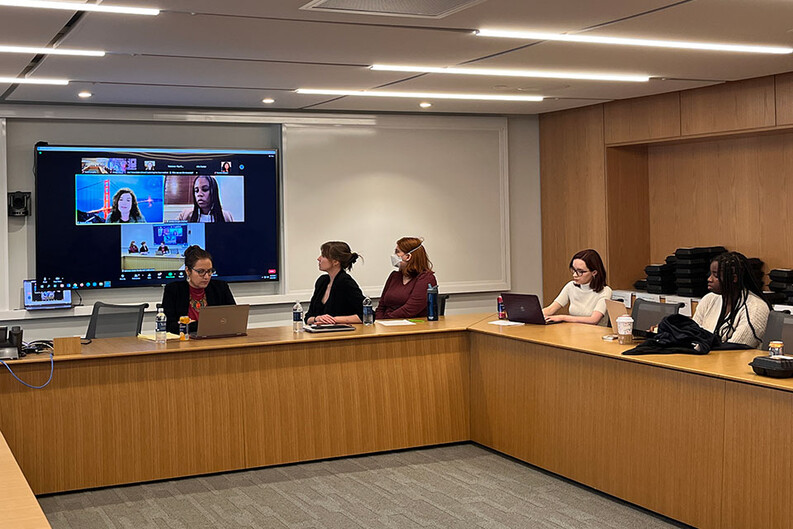Disability Law Scholars Review Recent Work at Solomon Center

The Solomon Center for Health Law and Policy, in collaboration with the Disabled Law Students Association and the Yale Health Law and Policy Society (YHeLPS), hosted a scholarship panel, Visions of Disability Justice: Recent Scholarship in the Field of Disability Law on Nov. 8.
Laura Hallas ’24 and Hannah Eichner ’24 moderated the panel that included Elizabeth Pendo4, Joseph J. Simeone Professor of Law at St. Louis University School of Law; Jamelia N. Morgan5 ’13, Professor of Law at Northwestern University Pritzker School of Law; and Jasmine E. Harris6 ’05, Professor of Law at University of Pennsylvania Carey Law School.
Pendo began by outlining the common thread between each piece of scholarship: disability justice. She discussed her recent piece, “Have Almost 50 Years of Disability Civil Rights Laws Achieved Equitable Care?” Significant health disparities disadvantaging people with disabilities still exist despite civil rights laws prohibiting such discrimination, and Pendo and her coauthors identified several barriers that exist in realizing the goals of various civil rights laws. These include disability data gaps, physical access to care, and disability competency training across health care professions.
Morgan proceeded to discuss how courts conceive of disability in wrongful arrest claims and failure to accommodate under the ADA in her piece, “Policing Under Disability Laws.” She identified that courts tend to have a cabined view of disability, characterizing it under a medical model that limits questions of access and mitigating discrimination that could be expanded under a lens elevating how disability operates as a socially constructed impairment.
Harris walked the audience through how she draws on a variety of disciplines to understand the lifecycle of disability discrimination and possible upstream interventions. She discussed two pieces of scholarship: “Debating Disability Disclosure in Legal Education” and “The Aesthetics of Disability.” Harris reviewed how socially constructed markers of difference that have limited the universe of what we perceive as disability to be physical and the privacy default established by law for the two-thirds of the population with disabilities without aesthetic markers. She also shared how this work has led her to her current project of articulating a positive theory of aesthetics for the law.
The panel ended with a brief Q&A session, during which the panelists discussed their entry into academia and recent trends in disability scholarship in context with their own scholarship.
By Cat Gassiot


